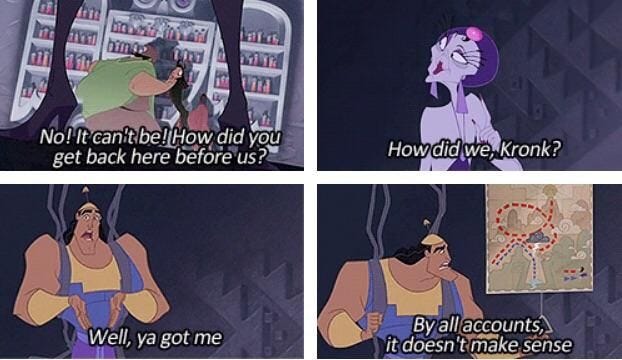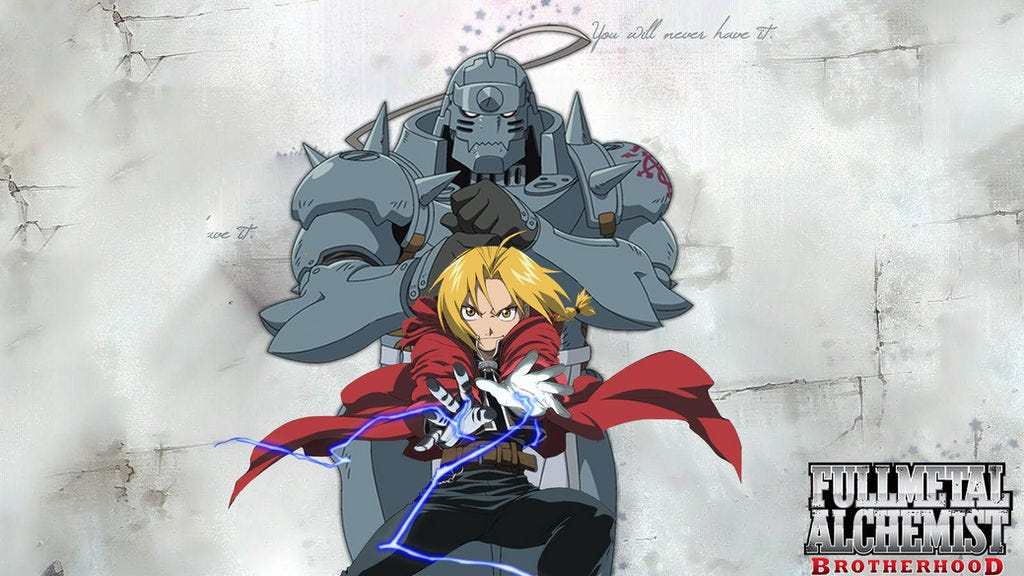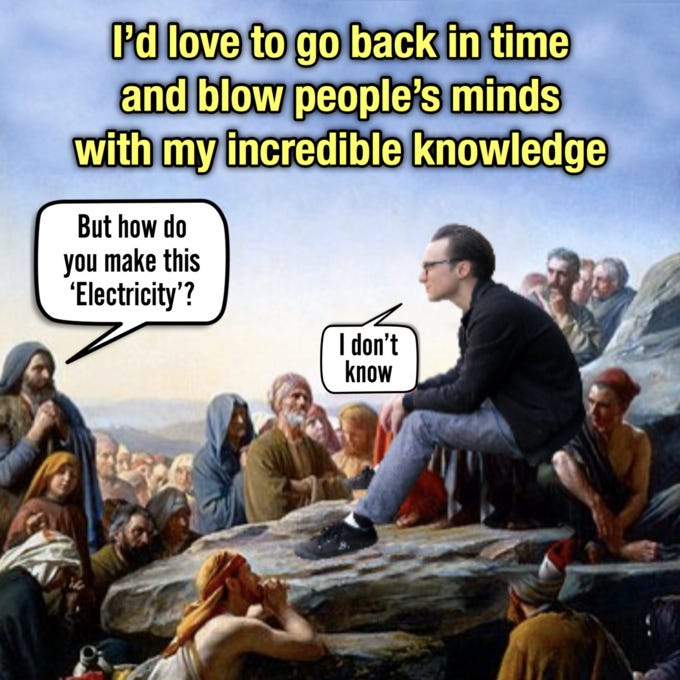Magic Says More Than You Think
Why magic should explain stories. [Magic Systems, Part 3 of 3]
Hi, I’m Eric. I write (and write about) epic fantasy. This week I’m once again joined by
for the final installment of our series on the narrative implications of magic systems.Over the last two weeks, we’ve looked at both hard and soft magic systems. We’ve seen the distinct advantages of each: most of all that hard(er) magic systems allow an author to center magic-use in the narrative, while soft(er) magic allows an author to more easily maintain mystery and wonder.
If you’re totally new to this topic, we recommend starting with this introduction to the terms, and some of the storytelling principles that surround magic within narratives.
To wrap things up, we’re going to look at the broader implications of using a magic system—any magic system—in the first place.
The fact is, any discussion about hard or soft magic can rapidly (d)evolve into much deeper questions about narrative, about fantasy (or spec fic), or about reality itself.
We’re not going to get philosophical about the nature of reality. However, we’ll look at why scratching at “magic systems” can very quickly suck you down a philosophical or diegetic rabbit hole.
Essentially, this is one giant narrative warning label. Don’t worry, we’ll also tell you how to handle magic safely.
Should You Cite the Deep Magic?
Let’s start with an obvious premise: the thing that separates a fantasy narrative from any other form of narrative is the fantastical. That’s the lowest common denominator, folks.
Now to expand that premise slightly: fantasy takes its strength from the ways that it differs from reality.
The way that a fantasy narrative takes exception from reality ultimately forms the backbone of that narrative.
Which means: a story’s exceptions to reality have an outsized influence on the themes, tones, and existential claims of a story.
At first it might seem abstruse that dragons or magical swords are concealing philosophical treatises and manifestos. However, this is actually one of the things that fantasy as a genre does best, and in fact the principle could be applied broadly to fiction as a whole. If it was discovered tomorrow that elves as we imagine them in Tolkienian lore actually existed seven-thousand years ago, what would that do to our understanding of history, or the world, or ourselves?
Just so for magic systems. If a wizard casts a spell that removes a soul from a body, then that magic system is likely implicitly endorsing a Cartesian model of hylomorphism whether the author meant to or not (or even knows what those words mean). In The Elder Scrolls series—arguably the most popular and decorated fantasy videogame franchise of all time—one of the main magic mechanics involves the ability to trap the souls of the slain in crystals for later use as what amounts to batteries for the wizard’s magical devices!

Soul-body duality and essential identity are concepts that many stories such as cyberpunk have explicitly explored, but what’s important to note for our purposes is that while your fun fantasy adventure might not want to encounter heavy questions, it might stumble into them anyway after introducing certain mechanics.
The point is not that every author needs a degree in philosophy or that every story must constitute a profound existential thesis. The point is that your story might be saying profound things anyway—whether you want it to or not—by virtue of its magic systems.
Authors ought to take note.1
There are a few primary ways for writers to handle these broader implications. And that’s what we’re looking at today.
You’ll notice these are on a spectrum—from avoiding or ruling out these implications to wholesale embracing them as part of the matrix of the story itself.
The point is: Storytellers Have Options.
Option #1: The Vibes Say, “Chill Bro”
A story can prohibit or discourage implications through its established tone.
Plenty of stories use tone for levity. Without it, Indiana Jones would be a mass-murderer, Bugs Bunny would be a domestic terrorist, and most romance male love interests would have restraining orders out against them.
If the tone of a story says that the story is not to be taken seriously, then it signals to the audience that these sticky implicative questions don’t really matter. This is all just for fun.
In Hellboy (2004), the crew at one point has to resurrect a man who died in WWII who will guide them into the villain’s lair.
This bears repeating: the heroes are literally performing necromancy!
This could have gone several different ways—almost all of them pitch dark—but the undead turns out to be more annoyed than anything to be back among the living. The moment gets played for humor, the tone remains light, and the story doesn’t veer into Frankenstein territory.
The downside of tonal deflection is that the story as a whole won’t be as deep. If the storyworld doesn’t have the load bearing structure for implicative questions, then it won’t be capable of supporting any other profundities.
However, a good story doesn’t need to be profound if that’s not the point. If the writers know what they’re doing and are conscious of tone, then a “shallow” story can still certainly be a ton of fun!2
Option #2: Design to Dodge Implications
Particularly in hard magic systems, most authors don’t really care about sussing out what the deeper implications are for the cool system they created. They just want to watch wizards throw fireballs or kung fu masters punch through walls. They structure their magic systems in a way that more or less precludes heavy questioning.
This isn’t the same as ignoring the constraints, it’s simply making design choices that don’t come with added baggage.
Rather than dodge questions through tone, you can dodge questions by thinking about them ahead of time and blocking possible routes of inquiry. This can maintain a more serious or sincere narrative tone while still providing ample opportunities for the fantastical.
Going back to Sanderson’s Mistborn, the abilities to ingest and burn metal in order to pull or push on objects, augment physical strength, or “roll for persuasion” don’t necessarily have broader repercussions. They’re just there for fun! Most superhero abilities fall into this category as well. We know exactly what Spider-Man’s webs, wall-crawling, and spidey sense can and cannot do, and none of them are really inviting any difficult questions.
On the flip side, these magic systems can start to feel superficial. The fact that they don’t say much is both an asset and a detriment; their status as set dressing means that other parts of the story have to do more lifting in terms of thematic or emotional development. Mistborn (at least the first book) ultimately has little or nothing to do with metal and superpowers but is instead about classism, oppression, revolution, and trust.
Likewise, spiders aren’t really important to Spider-Man, unless one reads in some buried symbolism; what Spider-Man’s really about is juggling domestic and heroic duties and the loneliness that attends heroic sacrifice. It plays the two identities off each other: Spider-man always wins, but Peter Parker never wins.
The mechanics of Spider-Man’s powers don’t really have any endorsement there or elsewhere.
In both cases, the magic system could be replaced with almost any other without changing the deeper arc of the story. The magical mechanics are innocuous, but also somewhat hollow. That’s fine if that’s what the writer is after—Spider-Man is flipping awesome, pardon the pun—but if one wants to either go deeper or employ systems with deeper implications then there are other ways to handle this.
Option #3: Hang a Lampshade on It
“Lampshading” is a term for when an element of a story is obviously cliched, improbable, or flawed, but the writers call attention to it rather than fight it. Oh, did a boom-mic accidentally dip into frame? Have a character hang a lampshade on it without breaking stride!
Lampshading can be as simple as a character directly pointing out the potentially problematic thing, or it can be more of a self-knowing wink the writers give the audience to show that the writers themselves are likewise in on the joke.

Lampshading is one way to preempt possible unwanted implications of a magic system.
WARNING: Done poorly, lampshading can undermine the story itself. Many movies of late (particularly superhero movies) have used lampshading to try and highlight the absurdity of their premises before the audience can get a chance to. The result though is that they end up reminding the audience of the improbability of the premise when they don’t need to, which undermines the emotional moments and renders them all as big jokes.3 If the writers themselves can’t take the story’s emotional beats seriously, then how is the audience supposed to?
While often getting used this way today, lampshading can be used to put a lid on some of the bigger questions that arise from magic systems, or at least prune them before they grow out of control.
In Robert Jordan’s The Wheel of Time, the series’ main villain Shai’tan is capable of a number of evidently self-contradictory feats across the series’ multiverse. When these inconsistencies are eventually pointed out, a more knowledgeable character explains that Shai’tan is the “embodiment of paradox and chaos, destroyer of reason and logic, breaker of balance, the unmaker of order."
…which is kind of a long way of saying, “This isn’t going to make sense to you, but don’t expect any further explanation. That door has shut. Go with it.”
This is, in effect, the author drawing a line and saying, “My magic system is hard up until right here.” There is nothing inherently wrong with a story doing that! That still effectively falls under managing audience expectations.
The anime show Jujutsu Kaisen does something similar. As mentioned in an earlier article, each character in the show has their own hard magic system, but each of those magic systems has its own implications.
For example, one character can make differential distances intransgressible or blast objects away as with a forcefield by using the principles of Zeno’s Paradox.
… but wait, doesn’t the fact that his magic works at all mean that Zeno was correct and all change is illusory??
Another character has the ability to manipulate souls—including his own—and thereby hideously mutate a person’s physical appearance into whatever he wants. Does that then mean that the soul is the true essence of a being? But if it also changes the body then that suggests the body is merely a physical manifestation of the soul rather than being separate.
Whenever these positions get brought up in Jujutsu Kaisen, a nearby character will point out that each of these unique magic systems constitutes “its own worldview.” The abilities on display are reflections of the sorcerers’ personal philosophies. This is a useful storytelling device because it means the magic system can be effectively tied to the given character’s temperament.
This is a great example of a magic system doing double-duty, borrowing the best from both hard and soft. You get the “hard” mechanics of magic in the particular, but you also get the “soft” of systems intuitively distributed based on character temperament. In some cases a character will experience a breakthrough of their own philosophy—often mid-fight, in the “pause time” way that only anime can pull off—and it will enable them to suddenly use their powers in a novel way.
Jujutsu Kaisen showcases a magical toolset that can be creatively manipulated as well as saying something about individual characters. The magic system is no longer just there for kicks. It’s getting integrated into the matrix of the story itself.
Of course this immediately brings up a more fundamental question about non-contradiction: if two different magic systems run on mutually exclusive philosophical claims, how can they both work?
The answer is actually quite simple if you considerwait LOOK OUT ANOTHER EPIC FIGHT!!
… Sorry, what were we saying? Oh yeah: each is its own worldview. Yeah. ‘Nuff said.
You might think we’re here to say this is wrong. We’re not. Lampshading might only constitute a deflection of the deeper questions, but it addresses the questions in its own way nonetheless. It allows for more leeway in regards to hard magic systems.
After all, even a deflection can communicate proper expectations to an audience (much like the aforementioned Option #1: Tone), and that’s what this is all about.
Option #4: Not a Bug, but a Feature
All of that said, the same implicative function of magic systems can be used to the writer’s advantage!
While often vague on particulars, many superhero stories deal with themes of isolation and personal sacrifice. The setup lends itself to these kinds of conflicts as superhero work typically demands anonymity. A superheroes’ road is often a lonely and thankless one, rendering their sacrifices all the more selfless.
But that’s just one example of how a story’s specific departures from reality (e.g. superpowers and their relationship to society) can further underscore a story’s themes, messages, and internal conflicts (e.g. selfless heroism).
For example, the anime Fullmetal Alchemist: Brotherhood (the manga is simply called Fullmetal Alchemist) involves a remarkably hard magic system, but one fundamental principle gets repeated over and over: The Alchemical Law of Equivalent Exchange, which says that to gain something, something of equal value must be lost, destroyed, or exchanged.
This is already a highly functional and informative principle in terms of what the alchemy magic system can and cannot do. Want a 24-carat gold bar? Better use some high-quality stuff in that transmutation! But the story manages to take the “law” of magic and turn it into a profound reflection on the value of human life..
Fullmetal Alchemist: Brotherhood follows two prodigious, adolescent brothers who commit a heinous alchemical taboo of attempting to use their magic to resurrect their dead mother. The results are horrific and they are both left hideously disfigured, lucky to be alive.
The rest of the story is about the two of them on a mission to restore the body of the other. But as the scale of their journey expands and takes them to the highest seats of power and the deepest nidi of corruption, The Law of Equivalent Exchange lurks above them like a specter. It doesn’t matter that these brothers are only children, they committed the taboo. Aren’t they getting exactly what they deserve? And what will they truly have to pay in order to rectify their mistakes? Is there any price that can be paid to atone for such grievous errors? Is there a “value” that can be placed on life, or is there an injustice inherent to this economy of value on which alchemy depends? To gain something, something of equal value must be lost, destroyed, or exchanged.
The relationship between this principle and the overall story is further galvanized by the brothers’ own dispositions. One of the reasons they became so prodigious at alchemy is precisely because they live by Equivalent Exchange in their daily lives and temperaments. The same axiom enabling them to wield magic so effectively is also tearing them apart on a personal level.
What makes Fullmetal Alchemist: Brotherhood so great is the fact that its magic system enables the employment of actual physics like combustion, thermodynamics, electromagnetics, and materials science, but all of these hard magic system applications simultaneously endorse the story’s theme and character arcs!
Honestly, we kind of love it.

Every story to some degree or another handles themes, or unifying ideas that manifest to greater or lesser extents over the course of a story. The themes might be heavily denoted and explicit like in Animal Farm or The Great Gatsby, or there might be many possible themes like in The Lord of the Rings or a Stanley Kubric film. As they say, theme emerges from the gestalt.
Magic systems, being part of that gestalt, are going to speak to the theme; when that “speaking” is intentional, it can be a powerful storytelling device indeed.
A Truly Magical Heuristic
There’s one final significant consideration for storytellers regarding any sort of magic system, and we want to point it out before we sign off with this series. Like a lot of other things we’ve mentioned, it's beyond the scope to exhaustively unpack, but it’s worth touching on here in the epilogue.
Sanderson’s definition of hard magic specifically emphasizes magic’s utility. In his essay he describes hard magic with words like “tool” and “use.” An operative assumption is that knowledge of a thing is tantamount to how to use the thing. Intentional or not, the implication of hard magic is often that knowledge of how to use a thing is sufficient for understanding what that thing is.
This is precisely why hard magic has an inverse relation to mystery: if “understanding” is defined through a hard magic heuristic of how to use the thing, then wonder, awe, and mystery have no inherent value. Mystery becomes to the storyworld what wrapping paper is to a gift: pretty and alluring, but bound for the wastebasket.
Owen Barfield, the founder of The Inklings writers group of which J.R.R. Tolkien and C.S. Lewis were eminent members, wrote a book touching on this subject called Saving the Appearances that curious readers would be wise to visit (it had an immense influence on the latter two writers and their philosophies on fantasy). In that book, Barfield refers to this utilitarian heuristic as “dashboard-knowledge.”
It goes like this: one could say that most everyone knows how cars work, but for most of us that knowledge is only about as deep as the wheel, pedals, and dashboard. Hence, dashboard-knowledge.

The underlying assumption that a magic’s “use” is tantamount to magic’s “value” is in many ways the heart of the debate about whether hard or soft magic is better. On one side, we have those authors (and fans) who do not want magic in the story unless it is knowable (at least in a dashboard-knowledge sense); on the other side, we have those who do not want magic unless it will remain mysterious and otherworldly.
And it’s worth noting here that Sanderson—the man who literally coined the terms hard and soft magic—describes his own fascination with hard magic as being very much “sci-fi.” In a recent podcast with Tim Feriss, he said that his worlds are fantasy, but with a sort-of-sci-fi worldbuilding when it comes to magic.
That little distinction is actually hugely important for understanding how Sanderson thinks about “magic,” and by consequence how the rest of us do as well.
As mentioned before, if magic is reducible to its operations and functions, then it’s technology. If it’s technology, then for many it’s no longer magical.
Yet at the same time, we still hold that “hard” and “soft” is not a truly clear dichotomy! Even our technology isn’t fully understood by its users!
Round and round and round we go….
We don’t know how to land this plane.4
But that’s more proof of why storytellers ought to consider the deeper implications of their fantastical elements.
Conclusion
Throughout this series, our focus has been on storytelling, and how one uses magic systems for stories.
Narrative masters Checkov to Vonnegut have said over and over, each in their own ways, that everything in a story ought to serve that story.
This series has essentially been one long application of that principle to the idea of magic systems. We’ve argued that any magic system needs to serve the story in which it is created.
All that stuff above about theme and deeper implications? That is just the final, deepest element of that service.
A magic system—any magic system—is going to be loud. As a fantastical element, it’s going to be a backbone of the story. It’s going to say something just by being there.
Go figure out what. And then say it well.
Thank you so much for reading our series on magic systems. It means the world to both of us.
Want to see how I handle magic in my own fiction? What about Ian? Check out the stories below.
And here’s Ian Dunmore’s story about strength, intellect, and what it takes to become a magister.
✹ ✹ ✹
If you really liked this and want to support my work directly, consider becoming a Forgemaster by taking out a paid subscription. I offer my Forgemasters exclusive short stories, behind-the-scenes posts, and a direct voice in my creative process. Join below 👇
It's worth noting that the story and its broader implications don’t need to reflect the author’s personal beliefs on any of these matters! Many excellent stories are just there to ask questions, anyway.
There’s an opposite vice here where a story takes itself too seriously, and perhaps broaches some of these deeper questions they should have left alone. Our point is that these are questions writers ought to be conscious of. Ignore at your own peril.
Specifically, the type of lampshading that exchanges emotional climaxes for humor or ridicule is called "bathos."
"I have no idea how to wrap up this section." // "Me either. Hang a lampshade on it I guess."










Amazing, amazing essay! Once again, love your spot-on examples of how different stories deal with the implications of their magic systems.
I think your essay helps explain why the 6-season superhero show "Miraculous: Tales of Ladybug and Cat Noir" has gotten a lot of flak from the fan base: It's not consistent in how it treats its magic.
In many episodes, it dodges deep implications through its this-is-just-a-fun-kids-show tone. (The villain of the day created a volcano so powerful it was literally pushing the Earth closer to the Sun? Eh, the magic butterflies fixed it, and we'll never revisit that potential power.)
But other episodes, and major season arcs, are deep explorations of the wide range of implications from the world's magic system. (The villain is trying to bring back someone from the dead, which will require remaking the whole universe and causing someone else to have died instead, rewriting the last several years of history. Or in one episode, the main character is pulled into a time-travel adventure to prevent an alternate timeline where central France (and the moon) is blown up by a corrupted version of her superhero partner, leaving her with lasting trauma and trust issues for the next season [but only when useful to a particular episode's plot, otherwise it's not there].)
The show seems to alternate between a don't-take-things-too-seriously kids show and a explore-the-deep-themes-of-life YA show, and the switches back and forth from episode to episode are rather jarring.
I appreciate y'all so much for putting these together. You've given me a lot of things to consider.